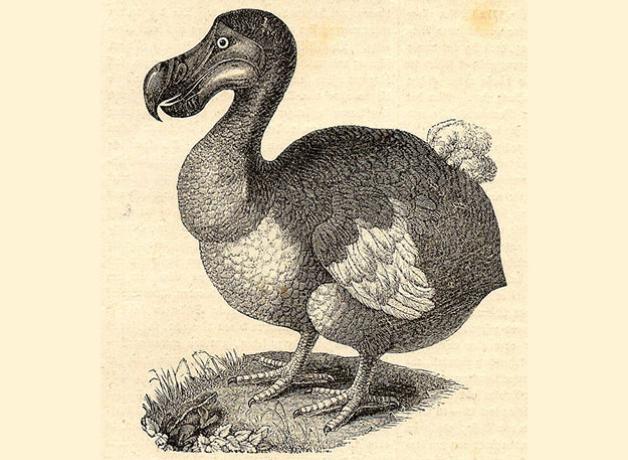

Join BirdNote tomorrow, November 30th!
Illustrator David Sibley and actor H. Jon Benjamin will face off in the bird illustration battle of the century during BirdNote's Year-end Celebration and Auction!
Nearly 400 years ago, Portuguese explorers were the first Europeans to lay eyes on the Dodo, on the island of Mauritius. By the early 1600s, Dutch sailors were provisioning their ships there, slaughtering Dodos as fast as they could find them. Hunting, along with the introduction of pigs and monkeys to the island, meant the Dodo's days were numbered. By 1690, the Dodo was extinct.
BirdNote®
Remembering the Dodo
Written by Bob Sundstrom
This is BirdNote.
Of all the bird species driven to extinction in recorded history, 90% have been island-dwellers. And amongst them, possibly the most famous is the Dodo.
[Sound of ocean waves]
Nearly 400 years ago, on the island of Mauritius, Portugese sailors were the first Europeans to lay eyes on this odd, flightless bird.
The stocky, gray-blue Dodo weighed up to forty-five pounds, walked on short, thick legs, and sliced open tough-skinned fallen fruit with an enormous, hooked bill. Ornithologists have since learned that the Dodo was descended from pigeons similar to the ground-dwelling Tooth-billed Pigeons of present-day Samoa in the South Pacific. Its song is unknown.
By the early 1600s, Dutch sailors were provisioning their ships on Mauritius, slaughtering Dodos as fast as they could find them. Hunting, together with the introduction of pigs and monkeys to the island, meant the flightless, ground-nesting Dodo’s days were numbered. By 1690, the Dodo was extinct.
[Sound of ocean waves]
For BirdNote, I'm Michael Stein.
###
Ambient water sounds provided by Kessler Productions.
Wave crash 'Surf Brilliant' recorded by Gordon Hempton of QuietPlanet.org
BirdNote's theme music was composed and played by Nancy Rumbel and John Kessler.
Producer: John Kessler
Executive Producer: Dominic Black
© 2014 Tune In to Nature.org December 2016/2020 Narrator: Michael Stein
ID #: 121305dodo dodo-01b



